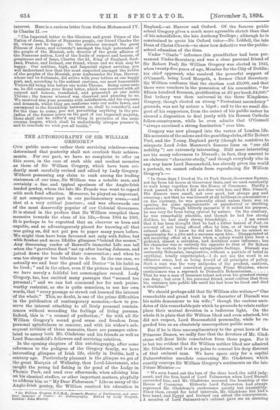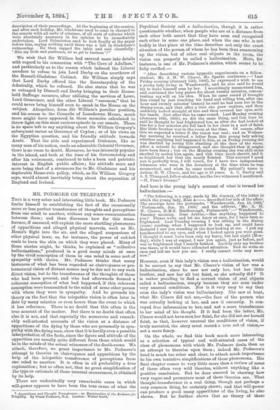THE AUTOBIOGRAPHY OF SIR WILLIAM GREGORY.*
Oun, public men—or rather their surviving relatives—seem determined that posterity shall not overlook their achieve- ments. For our part, we have no complaint to offer on this score, in the case of such able and modest memoirs as these of Sir William Gregory, which have been evi- dently most carefully revised and edited by Lady Gregory. Without possessing any claim to rank among the leading statesmen of our time, Sir William was a notable man, and certainly a fine and typical specimen of the Anglo-Irish landed gentry, whom the late Mr. Fronde was wont to regard with such fond affection. Moreover, he played an important, if not conspicuous part in our parliamentary arena,—and that at a very critical juncture ; and was afterwards one of the most deservedly popular of our Colonial Governors. It is stated in the preface that Sir William compiled these memoirs towards the close of his life,—from 1884 to 1891. It is perhaps to be regretted that an observer so keen and capable, and so advantageously placed for knowing all that was going on, did not put pen to paper many years before. We might then have been favoured not only with fuller, but with fresher and more lifelike glimpses "behind the scenes." Any discerning reader of Boswell's immortal Life can tell when the "garrulous Boot "sat up after leaving Johnson, and jotted down the heads of their conversation ; and when he was too sleepy or too bibulous to do so. In the one case, we actually see and hear the grand old Doctor "in his habit as he lived ; " and in the other, even if the picture is not blurred, we have merely a faithful but commonplace record. Lady Gregory, too, has omitted many passages that "seemed too personal ; " and we can but commend her for such praise. worthy restraint, as she is quite conscious, to use her own words, that "every passage so struck out lessened the interest of the whole." This, no doubt, is one of the prime difficulties in the publication of contemporary memoirs,—how to pre- serve the interest attaching to all lively personal reminis- cences without wounding the feelings of living persons. Indeed, this is "a counsel of perfection ;" for with all Sir William Gregory's sound good sense and freedom from personal spitefulness or rancour, and with his widow's sub- sequent revision of these memoirs, there are passages calcu- lated to annoy both Mr. Gladstone and his friends as well as Lord Beaconsfield's followers and surviving relatives.
In the opening chapters of this autobiography, after some references to the pedigree of the Gregory family, we have interesting glimpses of Irish life, chiefly in Dublin, half a century ago. Particularly pleasant is the glimpse we get of the great Marquis of Wellesley, then Lord-Lieutenant, who taught the young lad fishing in the pond of the Lodge in Phoenix Park, and used ever afterwards, when advising him on his classical studies, or other important matters, playfully to address him as "My Dear Fisherman." Like so many of the Anglo-Irish gentry, Sir William received his education in * Sir William Gregor% X.C.M.G., feinwarly Member of Parliament, and name- timo Governor of Ceylon LTJi Ant oLiography. Malted by Lady Grogory. London: John Murray.
England,—at Harrow and Oxford. Of the famous public school Gregory gives a much more agreeable sketch than that of his schoolfellow, the late Anthony Trollope ; although he is constrained to quote his Oxford tutor—Dr. Liddell, the late Dean of Christ Church—to show how defective was the public- school education of the time.
Under " Castle " influence (his grandfather had been per- manent Under-Secretary, and was a close personal friend of Sir Robert Peel) Sir William Gregory was elected in 1842, when twenty-five years of age, Member for the City of Dublin; his chief opponent, who received the powerful support of O'Connell, being Lord Morpeth, a former Chief Secretary. Sir William confesses that the election cost E9,000, and that there were vouchers in the possession of his committee, "for fifteen hundred freemen, gratification at £3 per head, 24,500." But bribery was then universal in the three Kingdoms. Gregory, though elected on strong "Protestant ascendency" grounds, was not by nature a bigot ; and to the no small dis- gust of his supporters, from the outset of his public career he showed a disposition to deal justly with his Roman Catholic fellow-countrymen, while he even admits that O'Connell "always exercised a strong fascination" over him.
Gregory was new plunged into the vortex of London life. His accounts of the salons and the gambling-clubs, of Sir Robert Peel, and the Young England party (though he contrives to misquote Lord John Manners's famous lines on "our old nobility ") are extremely interesting. Still more interesting are his many references to Disraeli ; in fact, they amount to an elaborate "character-study," and though everybody who in any way knew Lord Beaconsfield, has already given the world a portrait, we cannot refrain from reproducing Sir William Gregory's :—
"In those days I lived at No. 14 Park Street, Grosvenor Square, not far from his house at Grosvenor Gate, and we used constantly to walk home together from the House of Commons. Hardly a week passed in which I did not dine with him and Mrs. Disraeli. His dinners were small, not over good, but always gay and amusing ; not that he was himself at all brilliant in conversation ; on the contrary, he was generally silent unless there was an opening for some epigrammatic or paradoxical or startling observation. Though bitterly sarcastic if it suited his purpose, he was very far from being cynical by nature. On the contrary, ho was remarkably placable, and though he had few strong dislikes, he had many strong friendships I am aware that it has been thought that he had a bitter hatred of Peel, on account of not being offered office by him, or of having been refused office. I know he did not like him, for he missed no opportunity for a jibe and a sarcasm upon him. Disappointed at not receiving office at a time when a salary would have been a godsend, almost a salvation, had doubtless some influence; but his character was so entirely the opposite to that of Sir Robert as to be certain to produce antagonistic feelings. Disraeli was eminently Bohemian, imaginative, without a particle of belief in anything, totally unprincipled,—I do not use the word in an offensive sense, but as being devoid of 01 principles of policy Such a man was the very antipodes of the prudent, cautious, unimaginative, and somewhat pompous Primo Minister, whose
cautiousness was a reproach to Disraeli's Hohemianism That he was a man of immense talent not even his greatest enemy can deny ; but even I, his personal friend, must confess that from his entrance into public life until his last hour he lived and died a charlatan."
We should perhaps add that Sir William also writes,—" One remarkable and grand trait in the character of Disraeli was his noble demeanour to his wife;" though the curious anec- dotes of this remarkable pair which he proceeds to relate rather place their mutual devotion in a ludicrous light. On the whole it is plain that Sir William liked and even admired, but did not respect, Lord Beaconsfield personally, while he re- garded him as an absolutely unscrupulous public man.
But if he is thus uncomplimentary to the great hero of the Primrose Dames, we sadly fear that the devotees of Mr. Glad- stone will draw little consolation from these pages. For it is but too evident that Sir William neither liked nor admired Mr. Gladstone, and is at no pains to conceal his deep distrust of that eminent man. We have space only for a capital Palmerstonian anecdote concerning Mr. Gladstone, which exactly conveys Sir William Gregory's sentiments on the late Prime Minister :— "We soon found out the loss of the clear head, the solid judg- ment, and the firm hand of Lord Palmerston when Lord Russell succeeded him, and Mr. Gladstone assumed the headship of the House of Commons. Hitherto Lord Palmerston had always repressed Mr. Gladstone's exuberance quietly but irresistibly. Since then, except for brief intervals, Mr. Gladstone has had a free hand, and Egypt and Ireland can attest the consequences. A member of Lord Palmerston's cabinet gave me an amusing
description of their proceedings. At the beginning of the session, and after each holiday, Mr. Gladstone used to come in charged to the muzzle with all sorts of schemes, of all sorts of reforms which were absolutely necessary in his opinion to be immediately undertaken. Lord Palmerston used to look fixedly at the paper before him, saying nothing until there was a lull in Gladstone's outpouring. He then rapped the table and said cheerfully : Now rny lords and gentlemen, let us get to business '!"
We wish that Sir William had entered more into details with regard to his connection with "The Cave of Adullam," and particularly as to the reason which induced the Liberal seceders to refuse to join Lord Derby on the overthrow of the Russell-Gladstone Cabinet. Sir William simply says that Lord Derby offered him the Secretaryship of the Admiralty, which he refused. He also states that he was so outraged by Disraeli and Derby bringing in their House- hold Suffrage measure, after utilising the services of Lowe, Lord Grosvenor, and the other Liberal "cavemen," that he could never bring himself even to speak in the House on the subject. Altogether, from Sir William's peculiar position, and kr' access to the Councils of Lansdowne House, much more might have appeared in these memoirs calculated to throw light on this most curious episode in our annals. There is no space left to say anything about Sir William Gregory's subsequent career as Governor of Ceylon ; or of his views on the Egyptian question, and his friendly attitude towards Arabi. That the able and experienced Irishman, like so many men of his nation, made an admirable Colonial Governor, there is no room to doubt. Moreover, he was intensely popular in the island, and both at the time of his Governorship and after his retirement, continued to take a keen and patriotic interest in English public affairs ; his attitude more and more being that of a strenuous foe to Mr. Gladstone and his deplorable Home-rule policy, which, as Sir William Gregory says, would almost inevitably bring about the separation of England and Ireland.



















































 Previous page
Previous page